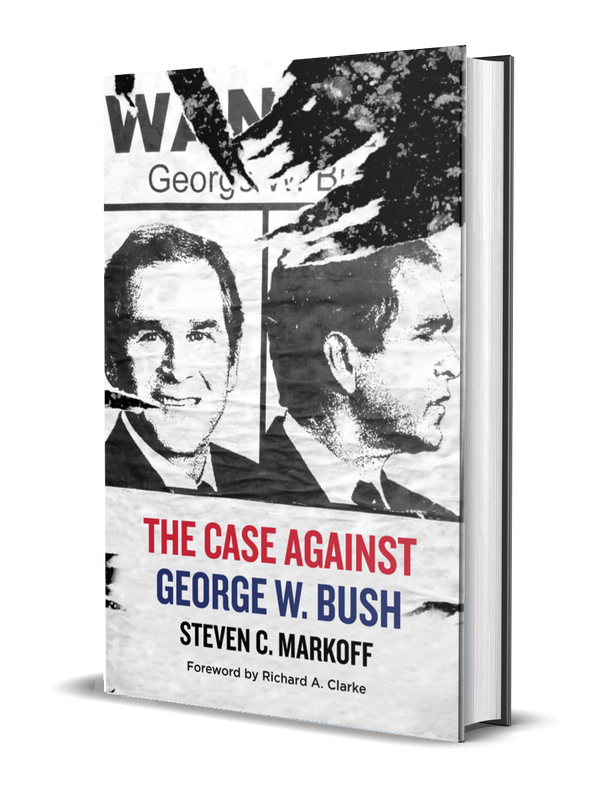Prior to September 11, 2001, President George W. Bush received substantial and constant intelligence about imminent terrorist attacks by Al-Qaeda and Osama bin Laden. Despite this intel, Bush, as commander in chief, did little or nothing to protect our nation from those attacks. Steven C. Markoff, author of The Case Against George W. Bush, says Bush's nonaction left our country vulnerable to 9/11, resulting in tragedy that didn't need to be.
"My book chronicles over 50 instances of high-level intel that Bush and his administration received prior to 9/11, intel that should have caused Bush to help our country avoid the coming terrorist attacks, or at worst, set up defenses to those impending attacks. He did neither,” Markoff says.
Few people realize that Bush received high-level intel about the coming dangers from Al-Qaeda and Osama bin Laden even before he was sworn in as president. Some of those pre-inauguration warnings chronicled in The Case Against George W. Bush include:
- 12/19/2000: President Bill Clinton briefed President-elect George W. Bush (GWB) about coming security problems generally, and about Al-Qaeda specifically.
- 12/20/2000: Richard Clarke (Clinton's counter-terrorism czar) briefed soon-to-be Secretary of State Colin Powell that Al-Qaeda was attempting to attack the US directly.
- 12/29/2000: The CIA offered a plan to go after bin Laden—a plan that was never taken up by the incoming administration.
- 1/5/2001: Outgoing National Security Advisor Sandy Berger briefed successor Condoleezza Rice that terrorism and Al-Qaeda would require the most attention from the incoming Bush administration.
- 1/10/2001: Outgoing CIA advisors named bin Laden one of the greatest threats to our country.
- 1/15/2001: GWB, Rice and Dick Cheney were secretly briefed that bin Laden and his network were a tremendous and immediate threat.
- 1/20/2001: Outgoing Deputy National Security Advisor Don Kerrick warned the incoming Bush administration about the threat posed by Al-Qaeda.
After George W. Bush became president, Bush and his administration were continually warned of coming terrorist attacks from Al-Qaeda and Osama bin Laden. Such warnings included:
- 1/25/2001: Five days into the new GWB administration, Richard Clarke sent Rice a memo and attachment mentioning AI-Qaeda over 120 times.
- 2/7/2001: CIA Director George Tenet in his first public testimony to the US Senate three weeks into the new administration said bin Laden is an immediate threat that was capable of planning multiple attacks with little or no warning.
- 4/3/2001: Bush decided to play down bin Laden's role in the deadly USS Cole attack, which killed 17 Americans.
- 4/18/2001: The FAA sent a memo to US Airlines that Middle Eastern terrorists might hijack and blow up an American jet.
- 6/21/2001: Journalist Bakr Atyani interviewed bin Laden, and was given a warning of a coming attack against America.
- 6/22/2001: CIA notified its stations that a bin Laden attack on America was imminent.
- 6/23/2001: Bush received a Senior Executive Intelligence Brief (SEIB) headlined, "Bin Ladin Attacks May Be Imminent."
- 6/24/2001: The Foreign Broadcast Information Service report stated that bin Laden was preparing to strike US and Israeli interests.
- 6/25/2001: Clarke warned Rice about six intel reports on pending Al-Qaeda attacks.
- 6/28/2001: A CIA alert memo was titled “Al-Qaeda attack imminent.”
- 6/29/2001: An SEIB report titled "Terrorism: Bin Ladin Threats Are Real," stated that talk of attacks was not part of a "disinformation campaign."
- 7/1/2001: Senator Dianne Feinstein on CNN warned that intel staff told her of a potential attack by bin Laden.
- 7/3/2001: CIA Director Tenet revealed that a bin Laden attack was imminent.
- 7/6/2001: Director of the Counterterrorist Center Cofer Black said that "we know something terrible is going to happen...the mood in the al-Qaeda training camps is one of jubilation."
- 7/9/2001: FBI Agent Ken Williams sent a memo to FBI headquarters that eight Middle Eastern men were studying at Arizona flight schools and that they should be checked out, but no action was taken.
- 7/12/2001: FBI Director Thomas Pickard raised concerns of an Al-Qaeda threat but Attorney General John Ashcroft no longer wanted such briefs.
- 7/15/2001: A secret Taliban emissary warned of a huge attack on American soil.
- 7/18/2001: An FBI counterterrorism budget increase was denied.
- 7/25/2001: CIA Director Tenet told the 9/11 Commission that by late July 2001, the threat level could not get any worse, the system was "blinking red."
- 7/31/2001: An aide to the Taliban foreign minister told an unnamed US official that bin Laden was planning a massive attack on US soil.
- 8/15/2001: A Minnesota flight training school told the FBI that a potential hijacker was training to fly a plane. One agent wrote in the margin of his interview notes that the guy was the type who might hijack a plane and fly it into the World Trade Center.
That same month, the CIA told the Pentagon that the US will be "struck soon."
- 8/25/2001: Bin Laden bragged to the London-based newspaper al-Quds al-Arabi that he was planning an unprecedented large strike against the US.
- 9/4/2001: Clarke in frustration asked Rice if the Bush administration was serious about dealing with the Al-Qaeda threat.
- 9/9/2001: When FBI agent Ali Soufan heard of an assassination in Yemen on 9/9/2001, he told another agent, "Bin Laden is appeasing the Taliban. Now the big one is coming."
- 9/10/2001: Ashcroft, one day before 9/11, denied a request from the FBI for more money for counterterrorism.
According to Markoff, "A cynical or sophisticated reader might suppose that, even if the above is true, the Bush administration must have done a lot to try to protect us from Al-Qaeda."
Markoff answers his own statement: "Unfortunately, after spending three and a half years going through 130 relevant books and reports, neither I nor my research team found any indication that George W. Bush or his administration took actions prior to 9/11 to protect our country from the Al-Qaeda attacks."
The 9/11 Commission report, issued on July 22, 2004, stated:
"In sum, the domestic agencies never mobilized in response to the [terrorist] threat. They did not have direction, and did not have a plan to institute.
The borders were not hardened. Transportation systems were not fortified. Electronic surveillance was not targeted against a domestic threat. State and local law enforcement were not marshaled to augment the FBI's efforts. The public was not warned."
Markoff observes that, "The great sadness is that had Bush acted responsibly given the plethora of intel he received prior to 9/11 saying we would be attacked by Al-Qaeda, 9/11 might have been averted and untold lives and American treasure saved. Without 9/11, Bush's administration wouldn't have tortured prisoners and he wouldn't have had the political capital to attack Iraq. Simply put, the passage of 20 years doesn't wash away criminal negligence over 9/11."
100% of the royalties the author would normally receive from the book are being directly donated to the non-profit National September 11 Memorial & Museum in NYC.


